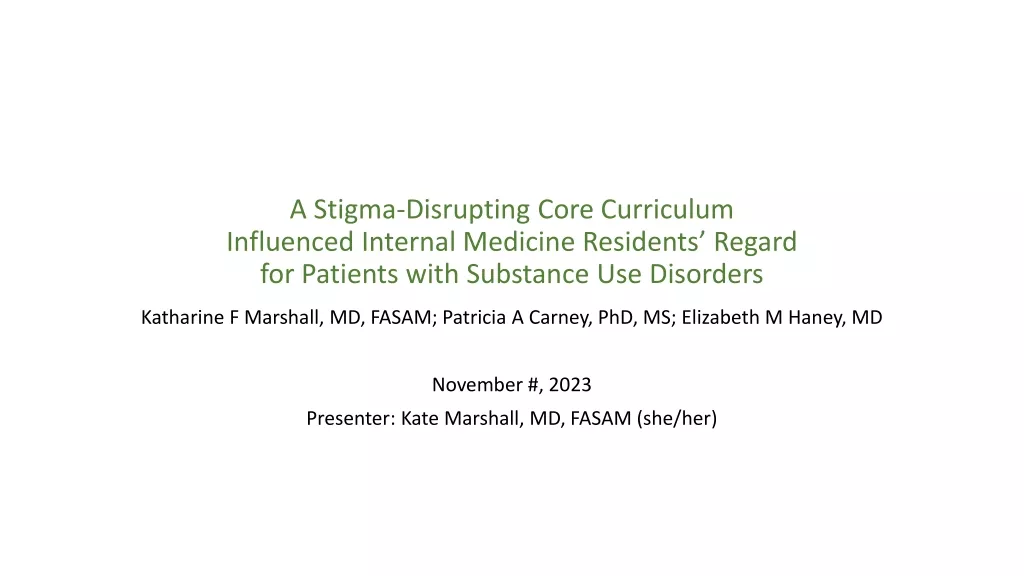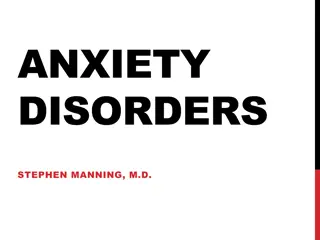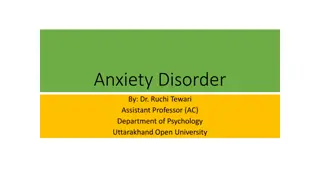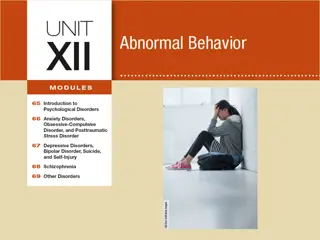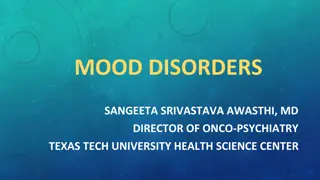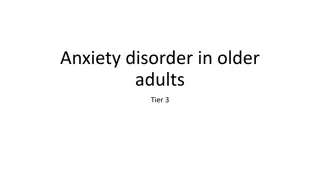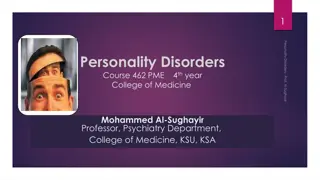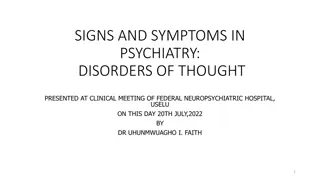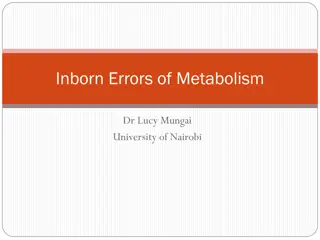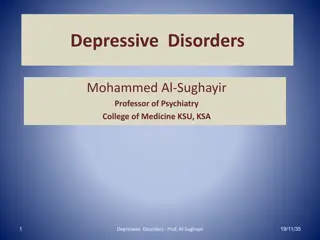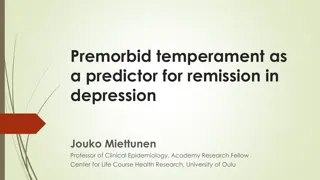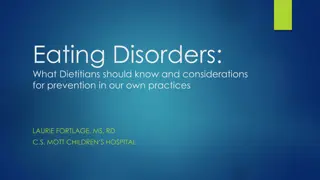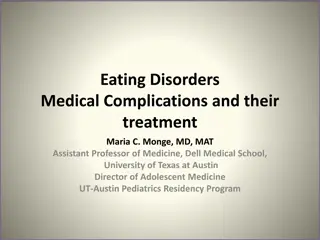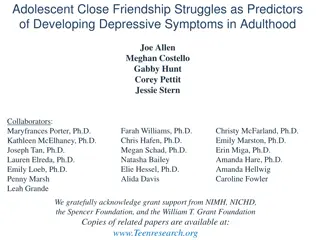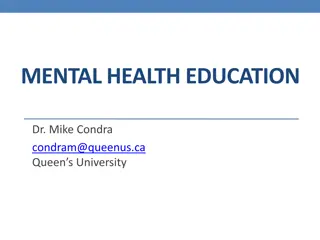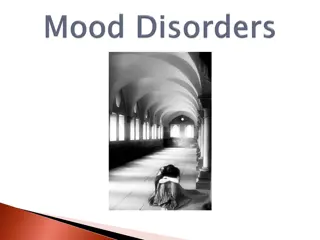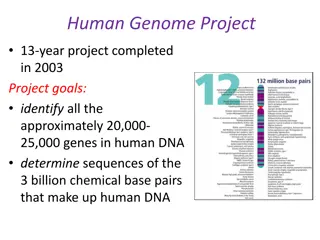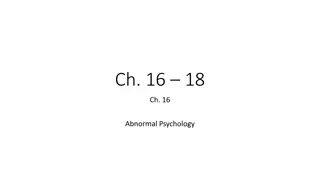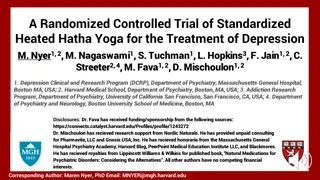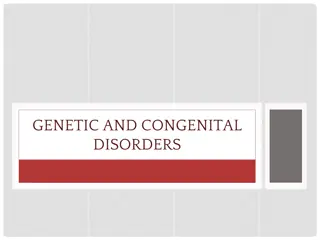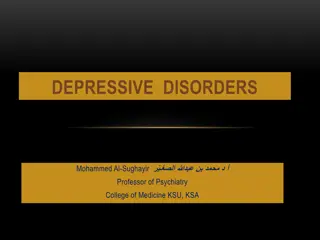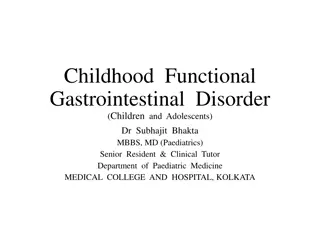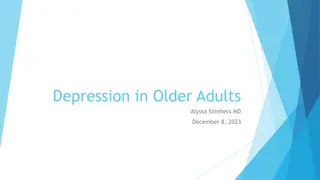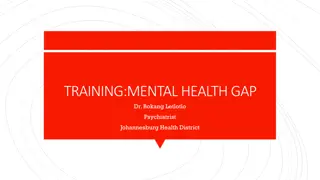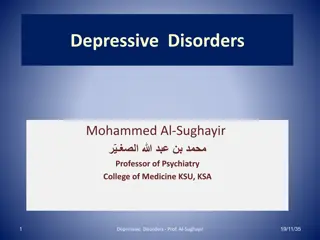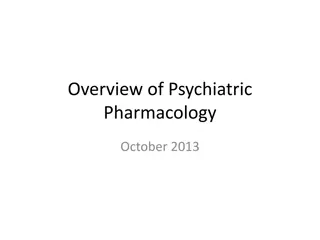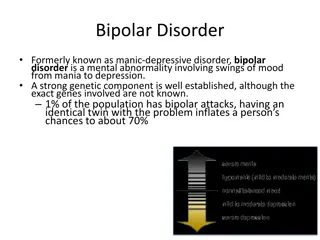Gynecological disorders
Common gynecological disorders including menstrual disorders and abnormal uterine bleeding. Find out about the nursing role in diagnosing and treating these disorders.
3 views • 22 slides
Enhancing Internal Medicine Residents' Approach to Patients with Substance Use Disorders
This study focuses on developing and implementing a stigma-disrupting curriculum to improve internal medicine residents' attitudes and knowledge regarding patients with substance use disorders. By addressing provider stigma and enhancing preparedness, the aim is to promote positive regard and increa
1 views • 27 slides
Exploring Mental Health Categories and Disorders
In today's categories, we delve into themes like stigma, recovery, myths, and facts surrounding mental health. We discuss various disorders including psychotic disorders and observable signs like hallucinations, delusions, and flat affect. Discover the signs and symptoms of mood disorders and high/l
1 views • 71 slides
Overview of Human Genetic Disorders
Human genetic disorders encompass a range of conditions, from recessive disorders like cystic fibrosis to dominant disorders such as Huntington's disease. Examples include cystic fibrosis, Huntington's disease, and sickle-cell anemia. Understanding genetic disorders involves research and awareness o
0 views • 10 slides
Understanding Anxiety Disorders in DSM-5
Anxiety disorders encompass a range of conditions, from separation anxiety to social phobia and generalized anxiety disorder. The DSM-5 has re-conceptualized these disorders, grouping OCD in its own category and moving PTSD to trauma-related disorders. Recognizing symptoms and seeking appropriate tr
1 views • 96 slides
Understanding Anxiety Disorders and Related Conditions
Explore the distinguishing features of anxiety disorders such as generalized anxiety disorder, panic disorder, and phobias, along with insights into obsessive-compulsive disorder (OCD) and posttraumatic stress disorder (PTSD). Delve into the impact of conditioning, cognition, and biology on these co
2 views • 46 slides
Overview of Anxiety and Related Disorders
Anxiety disorders, such as PTSD, panic disorders, phobias, agoraphobia, and OCD, are characterized by varying degrees of fear and distress. Anxiety is a normal response to danger, but when it becomes chronic, it can lead to debilitating conditions. PTSD occurs post-trauma, panic disorders involve in
1 views • 42 slides
Understanding Anxiety Disorders: Causes, Symptoms, and Types
Anxiety disorders are a group of mental illnesses characterized by excessive and overwhelming anxiety and fear. This article explains the normal emotion of anxiety, symptoms of anxiety disorders, types of anxiety disorders, and common causes like genetics, brain chemistry, environmental stress, and
1 views • 8 slides
Understanding Depressive Disorders and Bipolar Disorder
Depression is prevalent among students and individuals in the US. Major depressive disorder and persistent depressive disorder are characterized by varying degrees of depressive symptoms lasting for different durations. The diagnostic criteria include signs of depression persisting for specific peri
1 views • 57 slides
Understanding Mood Disorders and Assessment in Psychiatry
Mood disorders, such as Major Depressive Disorder and Bipolar Disorder, can significantly impact a person's life. They are characterized by disruptions to functional status and relationships. Assessing these disorders involves examining psychiatric history, medical background, and lab assessments li
0 views • 100 slides
Understanding Anxiety Disorders in Older Adults
Anxiety disorders in older adults are prevalent but often unrecognized. These disorders can manifest alongside depression, impacting daily life. Risk factors include gender, education, health status, traumatic events, and more. Types of anxiety disorders include generalized anxiety, phobias, panic d
0 views • 17 slides
Understanding Personality Disorders: A Comprehensive Overview and Classification
Dive into the world of personality disorders with this informative presentation by Professor Al-Sughayir. Explore the definition of personality, various types of disorders, traits, terminologies, and etiology. Gain insights into normal versus abnormal traits, functional impairments, and the role of
1 views • 25 slides
Understanding Somatic Symptom Disorders, Conversion Disorders, and Dissociative Disorders
Somatic symptom disorders manifest as physical symptoms without apparent cause, while conversion disorders involve specific physical symptoms incompatible with medical conditions. Illness anxiety disorder involves interpreting normal sensations as disease symptoms. Dissociative disorders lead to a s
1 views • 41 slides
Understanding Thought Disorders in Psychiatry: Insights from Clinical Meeting Presentation
Explore the definitions and divisions of thought disturbances in psychiatry, including disorders of thought stream, form, content, and possession. Delve into thought stream disorders like tempo and continuity disruptions, as well as form of thinking disorders seen in conditions like schizophrenia. G
1 views • 32 slides
Understanding Inborn Errors of Metabolism and Metabolic Disorders
Inborn Errors of Metabolism (IEM) are genetic disorders that disrupt metabolic pathways, leading to substrate accumulation or product deficiency. These disorders can be classified based on toxic accumulation, protein metabolism, carbohydrate intolerance, lysosomal storage issues, energy production d
0 views • 29 slides
Understanding Co-occurring Mental and Physical Health Conditions
Co-occurring mental and physical health disorders are prevalent and require an integrative multidisciplinary approach for effective assessment and treatment. This holistic approach helps address the complexity of managing multiple disorders in an integrated healthcare setting. Through a multi-direct
1 views • 37 slides
Understanding Functional GI Disorders: A Comprehensive Overview
Functional GI disorders encompass a range of conditions affecting the gastrointestinal system, such as irritable bowel syndrome and disorders of the gut-brain interaction. These disorders are characterized by no structural abnormalities but are influenced by factors like motility disturbance, viscer
0 views • 42 slides
Understanding Genetic Disorders and Their Impact on Health
Genetic disorders are caused by abnormalities in genes or chromosomes, leading to various health conditions. Inherited disorders can be passed down from parents to children, affecting physical makeup and processes in the body. In India, there is a high prevalence of genetic disorders, particularly i
1 views • 12 slides
Understanding Depressive Disorders: A Comprehensive Overview by Prof. Al-Sughayir
Explore the world of depressive disorders with Prof. Al-Sughayir as he delves into the definition, types, features, and etiology of depression. Learn about the case of Ms. Amal, a 27-year-old experiencing symptoms of depression, and understand the cognitive, mood, and behavioral changes associated w
0 views • 17 slides
Premorbid Temperament as a Predictor for Remission in Depression Study
Personality traits, specifically premorbid temperament, play a crucial role in predicting remission from depressive disorders. This study, led by Professor Jouko Miettunen, examines how premorbid personality can be a significant factor in assessing the risk and outcome of depressive disorders. By an
0 views • 11 slides
Understanding Eating Disorders: Types, Signs, Effects, and Recovery
Eating disorders are mental disorders characterized by unhealthy eating habits and can have severe physical and psychological consequences. This article explores the definition of eating disorders, signs to look out for, different types such as Anorexia Nervosa, Bulimia Nervosa, Pica, and Purging Di
0 views • 10 slides
Understanding Eating Disorders: Insights for Dietitians
Eating disorders are complex neurobiological conditions that are not merely about control or weight management. These disorders can affect individuals of all genders, body sizes, and socioeconomic backgrounds. Dietitians play a crucial role in identifying, assessing, and treating eating disorders, a
0 views • 41 slides
Understanding Eating Disorders: Medical Complications and Treatment
This presentation by Dr. Maria C. Monge covers the common eating disorders in teenage patients, potential medical complications, and the role of the medical team in treatment. It includes definitions of disorders like Anorexia Nervosa, Bulimia Nervosa, and Binge Eating Disorder according to DSM-5 cr
0 views • 60 slides
Understanding Neurodevelopmental Disorders in Childhood and Adolescence
Neurodevelopmental disorders in childhood and adolescence encompass a range of conditions including intellectual disabilities, communication disorders, autism spectrum disorder, and attention deficit/hyperactivity disorder. These disorders impact cognitive development, adaptive functioning, and comm
0 views • 30 slides
Understanding Sleep Disorders: Classification and Diagnosis
Sleep disorders encompass various conditions affecting sleep patterns and quality. They are classified into categories such as insomnia, sleep-related breathing disorders, central disorders of hypersomnolence, circadian rhythm sleep-wake disorders, parasomnias, and sleep-related movement disorders.
0 views • 32 slides
Adolescents' Friendship Struggles Predict Depressive Symptoms in Adulthood
Study by Allen et al. explores how adolescent friendship challenges can lead to depressive symptoms in adulthood. Failure to meet social-developmental tasks in adolescence may impact mental health later on, affecting relationship quality, loneliness, and physical health. Understanding these predicto
0 views • 34 slides
Understanding Mental Health Education and Support
Explore the importance of mental health education through activities like reviewing case scenarios, card sorting, and understanding the mental health continuum. Learn about common mental health problems and their signs, including mood disorders, anxiety disorders, disordered eating, suicidal ideatio
0 views • 26 slides
Understanding Grief and Depressive Disorders: A Comparative Analysis
Grief and depressive disorders share similarities but also have distinct differences. Grief is a universal emotional state following loss, while depressive disorders involve prolonged mood disturbances. The stages of grief include denial, anger, bargaining, depression, and acceptance, with intervent
0 views • 79 slides
Understanding Genetic Disorders and the Human Genome Project
The Human Genome Project, completed in 2003, aimed to identify all human genes and DNA sequences. Genetic disorders, like autosomal disorders and Huntington's disease, can result from mutations at different levels, affecting single genes, chromosomes, or multiple genes. Albinism and cystic fibrosis
0 views • 37 slides
Understanding Abnormal Psychology: Disorders, Symptoms, and Treatments
Explore the world of abnormal psychology through the lens of different disorders like depression, anxiety, and phobias. Learn about the definitions of abnormal behavior, DSM-V classifications, and various types of psychological disorders. Delve into the complexities of mental health conditions such
0 views • 39 slides
Standardized Heated Hatha Yoga for Depression Treatment Study
A randomized controlled trial was conducted to investigate the effects of heated Hatha yoga on depressive symptoms compared to a waitlist control group. The study involved 80 patients aged 21 to 60, with completion rates of 55% and 65% for the immediate yoga group and waitlist group, respectively. R
0 views • 10 slides
Overview of Classification of Psychiatric Disorders
Psychiatric disorders are illnesses with various manifestations that impact functioning due to disturbances in biological, social, genetic, and other factors. Two key classification systems, ICD-10 and DSM-5, categorize over 200 types of psychiatric illnesses. The ICD-10 includes categories like org
0 views • 18 slides
Overview of Genetic and Congenital Disorders and Their Causes
Explore the terminology, causes, characteristics, and results of genetic and congenital disorders, as well as the disorders of single-gene inheritance. Learn about autosomal dominant disorders like Marfan Syndrome and Neurofibromatosis. Discover how single-gene disorders are inherited and their impa
0 views • 24 slides
Understanding Depressive Disorders by Professor Mohammed Al-Sughayir
This informative presentation by Professor Mohammed Al-Sughayir discusses the differences between usual sadness and depression, various types of depressive disorders, recognition of depressive disorders, etiology, complications, and treatment options. It includes a case study of a 27-year-old woman
0 views • 24 slides
Understanding Childhood Functional Gastrointestinal Disorders
Functional Gastrointestinal Disorders (FGIDs) in children and adolescents are characterized by chronic or recurring symptoms that cannot be fully explained by current structural or biochemical tests. These disorders emphasize the role of normal development in symptom presentation and the lack of evi
0 views • 46 slides
Understanding Depression in Older Adults: Symptoms, Risk Factors, and Treatment Options
Depressive symptoms in older adults are common but often go unrecognized. While depression is not a normal part of aging, older adults may exhibit a variety of depressive symptoms. Risk factors include pain, isolation, insomnia, medical comorbidities, and more. Classification includes Major Depressi
0 views • 38 slides
Understanding Mental Health Gap and Disorders in Johannesburg Health District
Mental, neurological, and substance use disorders pose a significant burden on global health, with substantial socio-economic impacts. The WHO's Gap Action Program focuses on screening, early detection, and management of mild to moderate mental illnesses in non-specialized healthcare settings. The S
0 views • 17 slides
Understanding Depressive Disorders by Prof. Al-Sughayir
Explore the insights shared by Professor Al-Sughayir on depressive disorders, including understanding depression, its types, features, and pathophysiology/etiology. A case study of Ms. Amal sheds light on symptoms and causes of depression, along with secondary factors. Detailed descriptions of depre
0 views • 21 slides
Overview of Psychiatric Pharmacology: A Comprehensive Guide from 2013
This presentation delves into the nuances of psychiatric pharmacology, exploring common psychiatric conditions, historical perspectives on medical treatments, categories of psychiatric medications, and principles of treatment. It also touches on mental illness definitions from DSM-IV-TR and DSM-V, a
0 views • 27 slides
Understanding Mental Health Disorders: Bipolar Disorder, Anxiety Disorders, & More
Exploring various mental health disorders such as Bipolar Disorder, Anxiety Disorders, Generalized Anxiety Disorder, Panic Disorder, and Phobic Disorders. Learn about their symptoms, prevalence, and impacts on individuals' lives.
0 views • 41 slides

